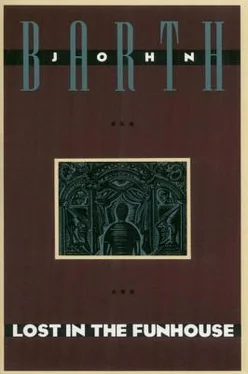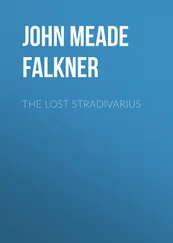“ ‘ “A likely story,” Helen said. “Next thing, you’ll say it was a cloud-Menelaus went fishing on the beach at Pharos! If I carry to my grave no heart-worm grudge at your decade vagrance, it’s only that it irks me less just now than your present doubt. And that I happen to be not mortal. Yet so far from giving cut for cut, I’m obliged by Love and the one right action of your life to ease your mind entirely.” Here she led me by the hand into her golden-Aphrodite’s-grove, declaring: “If what’s within your grasp is mere cloudy fiction, cast it to the wind; if fact then Helen’s real, and really loves you. Espouse me without more carp! The senseless answer to our riddle woo, mad history’s secret, base-fact and footer to the fiction crazy-house our life: imp-slayer love, terrific as the sun! Love! Love!”
“ ‘Who was I? Am? Mere Menelaus, if that: mote in the cauldron, splinter in the Troy-fire of her love! Does nail hold timber or timber nail? Held fast by his fast-held, consumed by what he feasted on, whatever was of Menelaus was no more. I must’ve done something right.
“ ‘ “ ‘You’ll not die in horsy Argos, son of Atreus …’ ” So quoted Proteus’s last words to me my love-spiked wife. “ ‘The Olympic gods will west you in your latter days to a sweet estate where rain nor passion leaches, there to be your wife’s undying advertisement, her espouser in the gods’ slow time. Not fair-haired battleshouts or people-leadering preserves you, but forasmuch as and only that you are beloved of Helen, they count you immortal as themselves.’ ”
“ ‘Lampreys and flat-fish wept for joy, squids danced on the wave-tops, crab-choirs and minnow-anthems shook with delight the opalescent welkin. As a sea-logged voyager strives across the storm-shocked country of the sole, loses ship and shipmates, poops to ground on alien shingle, gives over struggling, and is whisked in a dream-dark boat, sleep-skippered, to his shoaly home, there to wake next morning with a wotless groan, wondering where he is and what fresh lie must save him, until he recognizes with a heart-surge whither he’s come and hugs the home-coast to sweet oblivion. So Menelaus, my best guess, flayed by love, steeved himself snug in Helen’s hold, was by her hatched and transport, found as it were himself in no time Lacedemoned, where he clings still stunned. She returned him to bride-bed; had he ever been in Troy? Whence the brine he scents in her ambrosial cave? Is it bedpost he clutches, or spruce horse rib? He continues to hold on, but can no longer take the world seriously. Place and time, doer, done- to have lost their sense. Am I stoppered in the equine bowel, asleep and dreaming? At the Nile-fount, begging Love for mercy? Is it Telemachus I hold, cold-hearth Peisistratus? No, no, I’m on the beach at Pharos, must be forever. I’d thought my cave-work finished, episode; re-entering Helen I understood that all subsequent history is Proteus, making shift to slip me …’
“ ‘Beg pardon.’
“ ‘Telemachus? Come back?’
“To.’
“ ‘Thought I hadn’t noticed, did you, how your fancy strayed while I told of good-voyaging your father and the rest? Don’t I know Helen did the wine-trick? Are you the first in forty years, d’you think, I ever thought I’d yarned till dawn when in fact you’d slipped me?’
2
“Fagged Odysseus’-son responded: ‘Your tale has held us fast through a dark night, Menelaus, and will bring joy to suitored Ithaca. Time to go. Wake up, Peisistratus. Our regards to Hermione, thanks to her magic mother.’
“ ‘Mine,’ I replied, ‘to chastest yours, muse and mistress of the embroidrous art, to whom I commission you to retail my round-trip story. Like yourself, let’s say, she’ll find it short nor simple, though one dawn enlightens its dénouement. Her own, I’d guess, has similar abound of woof — yet before your father’s both will pale, what marvels and rich mischances will have fetched him so late home! Beside that night’s fabrication this will stand as Lesser to Great Ajax.’
“So saying I gifted them off to Nestored Pylos and the pig-fraught headlands dear to Odysseus, myself returning to my unfooled narrate seat. There I found risen Helen, sleep-gowned, replete, mulling twin cups at the new-coaxed coals. I kissed her ear; she murmured ‘Don’t.’ I stooped to embrace her; ‘Look out for the wine.’ I pressed her, on, to home. ‘Let go, love.’ I would not, ever, said so; she sighed and smiled, women, I was taken in, it’s a gift, a gift-horse, I shut my eyes, here we go again, ‘Hold fast to yourself, Menelaus.’ Everything,” I declare, “is now as day.”
1
It was himself grasped undeceivèd Menelaus, solely, imperfectly. No man goes to the same Nile twice. When I understood that Proteus somewhere on the beach became Menelaus holding the Old Man of the Sea, Menelaus ceased. Then I understood further how Proteus thus also was as such no more, being as possibly Menelaus’s attempt to hold him, the tale of that vain attempt, the voice that tells it. Ajax is dead, Agamemnon, all my friends, but I can’t die, worse luck; Menelaus’s carcass is long wormed, yet his voice yarns on through everything, to itself. Not my voice, I am this voice, no more, the rest has changed, re-changed, gone. The voice too, even that changes, becomes hoarser, loses its magnetism, grows scratchy, incoherent, blank.
I’m not dismayed. Menelaus was lost on the beach at Pharos; he is no longer, and may be in no poor case as teller of his gripping history. For when the voice goes he’ll turn tale, story of his life, to which he clings yet, whenever, how-, by whom-recounted. Then when as must at last every tale, all tellers, all told, Menelaus’s story itself in ten or ten thousand years expires, yet I’ll survive it, I, in Proteus’s terrifying last disguise, Beauty’s spouse’s odd Elysium: the absurd, unending possibility of love.
HEADPIECE
When Dawn rose, pink as peerless Helen’s teat,
which in fact swung wineskinlike between her hind legs and was piebald as her pelt, on which I write,
The salty minstrel oped his tear-brined eye,
And remarking it was yet another day …
Ended his life. Commenced his masterpiece. Returned to sleep.
Invoked the muse:
Twice-handled goddess! Sing through me the boy
Whom Agamemnon didn’t take to Troy,
But left behind to see his wife stayed chaste.
Tell, Muse, how Clytemnestra maced
Her warden into song, made vain his heart
With vision of renown; musick the art
Wherewith was worked self-ruin by a youth
Who’d sought in his own art some music truth
About the world and life, of which he knew
Nothing. Tell how ardent his wish grew
To autograph the future, wherefore he
Let sly Aegisthus ship him off to see
The Wide Real World. Sing of the guile
That fetched yours truly to a nameless isle,
By gods, men, and history forgot,
To sing his sorry self.
And die. And rot. And feed his silly carcass to the birds.
But not before he’d penned a few last words,
inspired by the dregs and lees of the muse herself, at whom, Zeus willing, he’ll have a final go before he corks her for good and casts her adrift, vessel of his hopeless hope. The Minstrel’s Last Lay.
Once upon a time
I composed in witty rhyme
And poured libations to the muse Erato.
Merope would croon,
“Minstrel mine, a lay! A tune!”
“From bed to verse” I’d answer; “that’s my motto.”
Читать дальше












